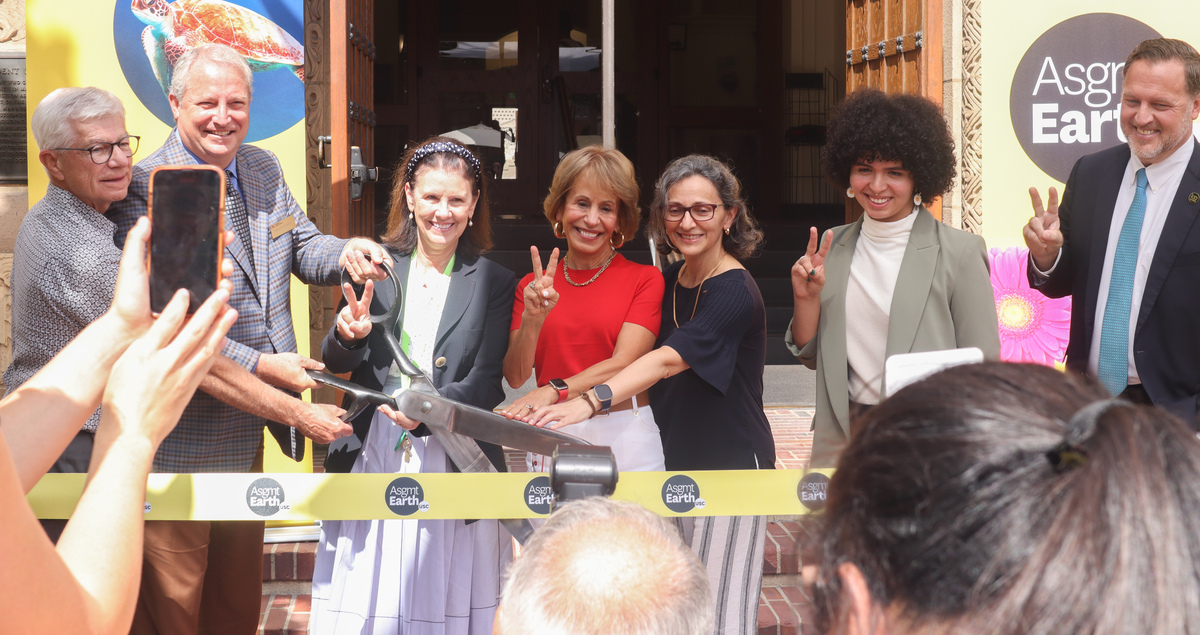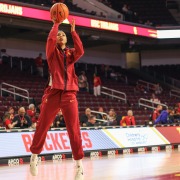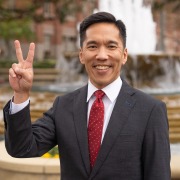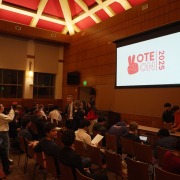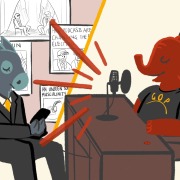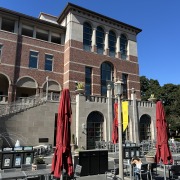Sustainability Hub debuts amid Green Week opening
The Hub will serve as a centralized location for sustainability goings-on at USC.
By NATHAN ELIAS & MATEO VILLALBA-MUTIS
Around 50 student groups and university organizations tabled in front of the Student Union Wednesday at a resource fair to showcase their sustainability efforts in anticipation of the grand opening of USC’s Sustainability Hub, the crowning moment of USC’s third annual Green Week celebration. The turnout is a reflection of USC’s efforts to promote sustainability and forecasts how Assignment: Earth, USC’s comprehensive sustainability agenda, will continue to shape the University in the coming years.
“From the beginning, Assignment: Earth was meant to be not about creating a silo of sustainability but about integrating sustainability into everything we do,” Chief Sustainability Officer Mick Dalrymple said about the fair. “The fact that groups want to come present … is phenomenal.”
President Carol Folt spoke on the importance of rapid climate change action, noting the effects of climate change in the recent tropical storm that passed through Southern California two weeks ago.
“Our precious oceans have to absorb more than 90% of human-generated greenhouse gas emissions,” Folt said. “Those oceans are becoming more acidic and that hurts marine life, including my much beloved plankton and shellfish that are the base of the entire food web including humans.”
Development for the Sustainability Hub took place over the course of nearly a year. Student members of the Presidential Working Group on Sustainability took inspiration from similar spaces on other college campuses and input from student groups on how they would use the space. Over a “rushed” process, Dalrymple said, workers transformed the former USC Pharmacy into the new Sustainability Hub. The result is a space that will serve as the “symbolic and physical home for Assignment: Earth,” Dalrymple said.
Sustainability groups on campus and a newly established cohort of postdoctoral fellows hired to pursue sustainability-related projects will utilize the space to collaborate, though Dalrymple said he envisions events ranging from lectures to “brown bag” lunch campaigns taking place at the Hub to bring more students into the fold.
The Hub takes cues from sustainable construction guidance published in July 2022 by Facilities Planning and Management by incorporating “biophilic” design — images, colors and sounds that evoke the natural world to promote connection with nature — as well as an exclusive use of environmentally friendly materials. The Hub is also piloting a “hybrid hoteling office space” model in which there are no assigned cubicles. Instead, four pods tucked in the back of the room are outfitted for Zoom and in-person meetings, which anybody can use.
Green Week festivities also include Make Mend II: Unravel, Unwind, a workshop hosted by the Roski School of Art and Design which will teach attendees techniques for repurposing old clothing materials, a sustainability-themed stroll with WalkUSC and open gardening hours with USC Peace Garden and the SC Garden club. The celebration will culminate with its annual zero-waste football game Saturday against Stanford University.
After speeches, the Los Angeles Department of Water and Power awarded USC with a ceremonial check for nearly half a million dollars. The check represents the total value of rebates awarded for LED lighting retrofits in five University buildings, including Norris Dental Science Center, Vivian Hall, Tutor Hall of Engineering, Mudd Building and Kaprielian Hall.
Representatives from the Dornsife Public Exchange spoke about its climate activism project, the Urban Tree Initiative, at the resource fair. The initiative is a three-year partnership with the City of Los Angeles to support its efforts in planting 90,000 trees in East and South L.A. to remedy historic inequities in pollution across the city. The organization brought teams of researchers and students to help identify optimal opportunities to plant trees.
The Environmental Student Assembly also had a booth at the event, where co-executive directors Valerie Kuo and Connor Castillo said one of their goals is to make the University stop accepting investments from fossil fuel companies.
“Our school is putting on a front that we’re so green and wants to sort of distance ourselves from fossil fuels,” Castillo said. “We shouldn’t be taking money from, say Chevron and other fossil fuel sources.”
In recent months, USC made progress in Assignment: Earth goals by launching a solar energy project to hoist solar panels onto graduate student housing beginning in July, which will contribute 64 megawatts of energy — equivalent to the emissions of 116,620 miles driven by cars — each year.
The Office of Sustainability published its second sustainability literacy survey in August revealing that engagement efforts produced mixed results thus far: Mean scores for sustainability literacy topics such as renewable energy and climate change rose by 1.8% while scores representing sustainable behavior and culture topics such as interest in joining sustainability groups or minimizing waste dropped by 3.7%.
Climate change’s largest problem is apathy from the general public for solutions, said JJ Flores, a junior majoring in international relations who spoke during the opening ceremony. Flores stated that often, news outlets can publicize big solutions to this large problem, so it feels like it’s all out of the average layman’s control. However, they argued that grassroots movements starting with individuals is often the best way to enact change.
“In my experience, the people who are impacted the most by climate have the least power to do something about it,” Flores said. “And yet, they hold the key to change.”
The Office of Facilities Planning and Management was also at the Sustainability Hub event and Nick Belgrade, the zero-waste auditor for the waste management team, outlined FPM’s strategy to achieve zero waste by 2028.
One of these goals was to add the recycling and composting bins indoors and everywhere else on campus to incentivize smarter waste management at the source, as well as adding what Belgrade nicknamed the ‘I don’t know’ bin for people who are unsure where their waste goes.
“We’re just learning how to be more efficient with these rollouts and how to communicate the program,” Belgrade said.
DONATION PLUG – PLEASE DO NOT TOUCH
Thank you for reading the Daily Trojan.
We are the only independent newspaper here at USC, run at every level by students. That means we aren’t tied down by any other interests but those of readers like you: the students, faculty, staff and South Central residents that together make up the USC community.
Independence is a double-edged sword: We have a unique lens into the University’s actions and policies, and can hold powerful figures accountable when others cannot. But that also means our budget is severely limited. We’re already spread thin as we compensate the writers, photographers, artists, designers and editors whose incredible work you see in our daily paper; as we work to revamp and expand our digital presence, we now have additional staff making podcasts, videos, webpages, our first ever magazine and social media content, who are at risk of being unable to receive the compensation they deserve.
We are therefore indebted to readers like you, who, by supporting us, help keep our paper daily (we are the only remaining college paper on the West Coast that prints every single weekday), independent, free and widely accessible.
Please consider supporting us. Even $1 goes a long way in supporting our work; if you are able, you can also support us with monthly, or even annual, donations. Thank you.

